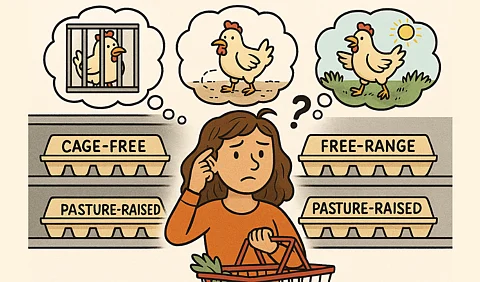In many conventional farms, hens are confined to tiny cages. According to available data, there are typically two types: standard battery cages, which offer just 67 square inches (a little over 8x8 inches) of space, and the newer "California cages" which measure about 10.5x10.5 inches. Both are so cramped that chickens can barely turn around, let alone move freely. They often end up living in their own waste, increasing the risk of disease and infections. Many of these chickens die prematurely, and those that stop laying eggs are often sent to slaughter.
Beyond living conditions, conventional chickens are frequently fed genetically modified (GMO) corn and soy, treated with pesticides, and routinely given antibiotics to prevent infections—rather than being kept healthy through better conditions.
Even "cage-free" or "free-range" labels can be misleading. Cage-free hens are usually kept in large pens, but space is still limited—sometimes just 12x12 inches per bird. Free-range hens may get a bit more room inside barns and may or may not have access to the outdoors.


